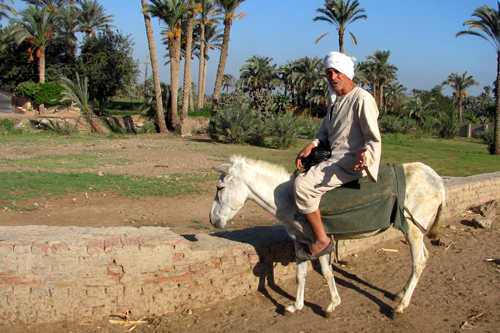
A prized domesticated animal in ancient Israel, the donkey is, collectively, referred to more than 150x.

Egyptian farmer on a donkey.
Translating at least five different Hebrew words, all these animals are simply different species of the genus Equus, to which also belongs the horse. It most frequently translates chamor; scholars remain puzzled over the root of this word, meaning red, since few donkeys are reddish in colour. Less frequently is 'aton, 'she-donkey,' and 'ayir, 'male-donkey.' The donkey is believed to be the domesticated form of Equus asinus, a native of north-east Africa. Another related animal, the pere' (11x) is usually translated 'wild donkey.' Many commentators identify this with the 'onager,' Equus onager, still to be found in parts of west-central Asia. Rarer still is the 'arod, 'wild donkey,' mentioned only in Job 39:5 (NIV leaves it untranslated, assuming it to be a reference to the 'wild donkey' in the first half of the verse; NKJ translates it as 'onager,' NRS & ESV as 'swift ass') and Dan 5:21 (in its Aramaic form, 'arad). In English the donkey is synonymous with the ass (which is the word often used in KJV for the 'donkey' in modern translations).
The donkey is first mentioned in Scriptures in relation to Abram acquiring them when he made his way to Egypt and passed off Sarai to Pharaoh as his sister (Gen 12:16). This is much earlier in time than the mention of the mule, which first finds its way into the Bible almost a millennium later in the time of David. No satisfactory explanation has been offered for this.
In the popular imagination, we tend to think of the donkey and mule as similar animals, serving mostly purposes of transportation and other domestic burdens. As far as it may be discerned in the various references to the donkey in the OT, however, the donkey appears to be more distinctively favoured over the mule, often grouped with the sheep and cattle. Among some of the first instructions to be given to Israel as an elect nation is the command to redeem "with a lamb every first donkey" along with the command to redeem "every firstborn among your sons" (Exo 13:13). It is one of the animals specifically mentioned as a benefiting from the Sabbath commandment (Exo 20:17; Deut 5:14) and protected from coveteousness (Exo 20:17; Deut 5:21), as well as theft and negligence (Exo 22:4, 9, 10; 23:4-5). While the ox and the donkey are named in these commandments only as representative of all the animal possessions, they fact that they are so frequently represented them is an indication of the special place they have in the mindset of ancient Israelites. The donkey is also never mentioned, unlike the horse or mule, in use in contexts of war, and Israelites were forbidden from yoking an ox and a donkey together (Deut 22:10) or to eat of its flesh—2 Ki 6:25 made it a point to note how Ben-Hadad's siege of Samaria had grown so severe that "a donkey's head was sold for eighty shekels of silver." Additionally, Zechariah prophesies that Israel's redeeming king will come "righteous and having salvation, gentle and riding on a donkey, on a colt, the foal of a donkey" (Zec 9:9).
The donkey also finds itself often into poetic and metaphorical situations in the OT. Recognizing his death was near Jacob called his children to tell them "what will happen to you in the days to come." Judah, he proclaimed, "ill tether his donkey to a vine, his colt to the choicest branch; he will wash his garments in wine, his robes in the blood of grapes" (Gen 49:11), while "Issachar is a scrawny donkey lying down between two saddlebags. When he sees how good is his resting place and how pleasant is his land, he will bend his shoulder to the burden and submit to forced labour" (Gen 49:14-15). Zophar notes how "a witless man can no more become wise than a wild donkey's colt can be born a man" (Job 11:12), while Job, complaining about the violence of life, observes how, often, "like wild donkeys in the desert, the poor go about their labour of foraging food . . ." (Job 24:5). Through Isaiah, Yahweh made know the pain of his heart, for "ox knows his master, the donkey his owner's manger, but Israel does not know, my people do not understand" (Isa 1:3), and through Jeremiah, that Israel is "a wild donkey accustomed to the desert, sniffing the wind in her craving—in her heat who can restrain her? Any males that pursue her need not tire themselves; at mating time they will find her" (jer 2:24). In what is probably the most graphic simile to be found in the Bible, Judah is pictured as a woman, named Oholiah, who "lusted after her lovers, whose genitals were like those of donkeys and whose emission was like that of horses" (Eze 23:20).
While 'donkey' appears only about 8x in the NT, where it translates three different Greek words, onos, onarion, hypozugion, the young donkey, polos, translated 'colt,' also appears 15x. The majority of its usage relates to Jesus' triumphal entry into Jerusalem (Matt 21; Mk 11; Lk 19:28ff.; Jn 12:12ff.).

©ALBERITH
010116lch